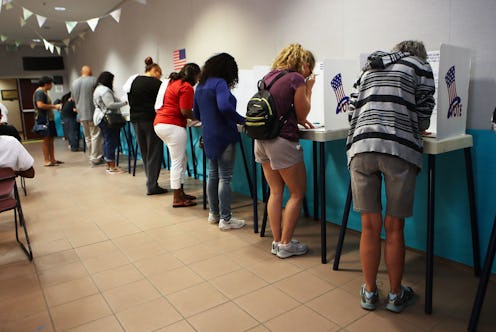News
A New Study Shows Why Women Candidates Who Lost Shouldn't Give Up Running For Office

The 2018 midterms are over, and while Republicans maintained control of the Senate, Democrats flipped the House in their favor. Though dubbed the "Year Of The Woman," some female candidates were inevitably defeated, though that doesn't mean that hope is lost for them. A new study shows why women who lost their elections should not give up their dream of running for office, and offers some insight into what they should do next.
“This has been a thrilling year for women candidates. Yet we know that for every woman who made history, there were many more who didn’t win their races,” Barbara Lee, president and founder of the Barbara Lee Family Foundation, which released the research, says in a press release. “Our new research confirms my long-held belief that women can rebound successfully after a defeat. It’s important for women candidates to know that voters say they will not penalize women who lose an election.”
The study was done by Lake Research Partners and Bellwether Research & Consulting, and focused on how voters react to women candidates who lose their bids for public office. Its results suggest that, for women, a loss does not necessarily mean the end of a political career. In fact, according to the study, voters by and large still rate women candidates favorably after they lose an election, and still believe that women candidates are qualified to run again in the future.
This is important to consider after a record number of women ran for election in this week's midterms. There is very little additional research available regarding how voters react to such a large wave of women entering politics because it has simply never happened before in the United States.
If a woman candidate fresh off of a failed election were going to run again, the study's results suggested, voters preferred that she take several things into consideration. Based on the data, the study's authors concluded that voters wanted to "see a losing candidate who is a community-focused, issues-oriented public servant rather than someone trying to acquire money, power, or attention."
And that includes the language they use immediately after losing. “Not putting any excuses in your speech and owning what occurred because there is always going to be a loser," responded one Democratic woman polled in the study.
It's difficult to compare how voters would respond to failed women candidates relative to failed non-women candidates because U.S. politics has always been a male-dominated field. But even before 2018, humbly accepting a defeat was largely seen as the de facto appropriate response. And according to the study released by the Barbara Lee Family Foundation, this remains true for women. "Cooperation," according to the data, was the highest ranked quality that a defeated female candidate should demonstrate.
According to the study, voters did not appear to believe that women losing elections meant that women running in future races were more likely to lose. In fact, respondents rejected negative media coverage that suggested that was the case. Per the research, 76 percent of voters polled said that they had "no doubts" about voting for a woman candidate, even after being presented with reports about the number of women who lost their races.
What this suggests is that, though some women lost their bids for public office in this round, a bit of resilience — combined with outward thinking — could mean that a successful election is still yet to come. And the rebound begins immediately.